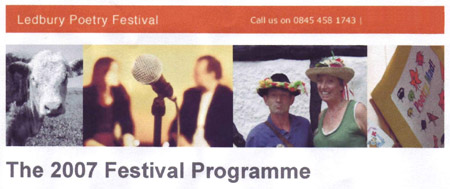It was in 2004 that I took a more active interest in The Poetry Society of which I had been a member for some years.
It had long seemed to me that most of the new pieces that were published as ‘poetry’ in the Society’s quarterly Newsletter and in its magazine Poetry Review were not truly poetry at all.
I attended the Society’s AGM in November. At this time the Chair of the Council of Trustees was Ruth Padel, and the Society was in the process of revising and modernising its constitution. I drew the attention of the meeting to the fact that whereas in the Society’s original constitution its ‘Objects’ are stated as,
To advance public education in
the study and use of poetry,
in its Trustees’ Report of that year it was stated that,
The Poetry Society exists to promote
contemporary poetry and poets in Britain.
* * *
Early in 2005 I determined to promote my ideas as to the true nature and definition of poetry more widely, with a website, and by founding something I called The True English (Poetry) Party.
I then wrote a short paper, a foundation document, ‘On English Poetry and Poems’
This paper went out to many. It was sent, of course, to Ms Padel and to each Trustee of the Poetry Society, and to its Director, in a letter that also announced the intended True English (Poetry) Party. I sought their opinion on the paper, and repeatedly asked for the Society’s own working definitions of ‘poetry’ and ‘poem’.
Nothing was forthcoming; until one of the Trustees wrote me a personal letter that contained this statement:
There is poetry in everything we say or do and if
something is presented to me as a poem by its
creator, or by an observer, I accept that some-
thing as a poem.
I replied that I thought this statement fatuous, and I told the Society’s Chair, Ms Padel, so. She then responded herself:
As for ‘what poetry is’: in The Use of Poetry
T.S. Eliot said, ‘We learn what poetry is – if we
ever learn – by reading it.’
I replied that I found this beside the point.
These matters may be reviewed in detail in the Archive of The True English (Poetry) Party here.
* * *
In July 2006 I went to the Ledbury Poetry Festival. I had attended some events the previous year.
I advised the Festival Director, Dr Charles Bennett, that I would be making a visit and would be politely ‘demonstrating’ as The True English (Poetry) Party, with placards and a tin whistle. I had tickets to several events including one presented by Ruth Padel and others.
I went to Ledbury with my Agent, Ms Dorli Nauta, who is also the Other Officer of The True English (Poetry) Party. We provided a colourful spectacle that subsequently led to our appearing on the Festival’s website masthead as ‘revellers’.

This launch of the Party, which seems to have caused Ruth Padel much consternation, may be viewed on another page here.
In May 2006 I found that Ruth Padel, at the time Chair of The Poetry Society, had placed a rather silly and ignoble piece on her website. It made direct reference to me, but not by name. Here is the start of the piece:
Rhyming Wars
Published in the Guardian Saturday Review, Commentary, August 2006
Poetic form rouses strange passions. Even at the Royal Society of Literature, poets can be heckled for their views on it. At Ledbury Poetry Festival someone demanded his money back from all the events he had been to because he missliked a poem. But of all aspects of verse writing, rhyme provokes the most ire.
Rhyming is only one among many ways in which poetry does its job of satisfying the ear and the understanding while getting words to belong together. But in England it is the perennial rallying flag for people claiming to ‘stand up’ for tradition by not reading much modern poetry. Italian poets invented the sonnet but their counterparts today do not get protested at as, last month at Ledbury, Jo Shapcott, Sean O’Brien and I did ( currently the Poetry Society’s President, Vice President and Chair), on the grounds that the Poetry Society supports the wrong sort of poetry: Poetry that does not rhyme.
A sandwich board was involved in the protest, a straw hat covered in paper flowers, and a new political party which says that all English poetry should rhyme.
We were thinking of other things, reading for and event called ‘Naming Your Place’…..
So a sudden heckle about rhyme took us by surprise….
Let me deal here with the main falsehoods and innuendos:
- Ms Padel, Ms Shapcott and Mr.O’Brien were not ‘heckled’.
- They were not even ‘protested at’.
- No statement of any sort was made by me at Ledbury about The Poetry Society or about rhyme.
- The sandwich boards mentioned by Ms Padel do exist and may well return to Ledbury; but they say nothing about The Poetry Society or about rhyme.
- The ‘new political party’ that Ms Padel does not have the courage to name does not anywhere say that ‘all English
poetry should rhyme.’
Silly ass.
At the end of the piece this statement is made:
The rhyming wars of the seventeenth century, and the more popular aspect of modern ones in the UK, are explored in a bit more depth in Part One of THE POEM AND THE JOURNEY, and the Introduction to 52 Ways of Looking at a Poem. See under ‘Books’.
I shall present here a series of papers dealing with these issues and with Ms Padel’s poetics.

